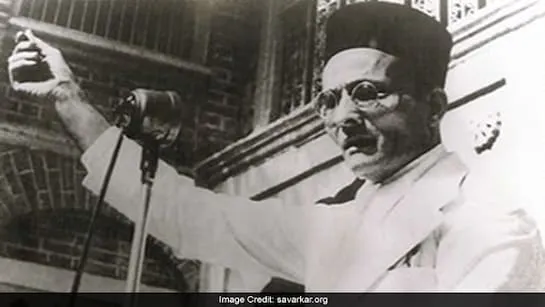📍 Sanchar News Special Feature
🕘 Stay connected 24×7 for historical truths and national insights
Who Was Veer Savarkar?
Vinayak Damodar Savarkar, popularly known as Veer Savarkar, was a freedom fighter, poet, philosopher, social reformer, and the ideological father of Hindutva. Born on 28 May 1883 in Bhagur, Maharashtra, Savarkar’s life was marked by revolutionary nationalism, literary brilliance, and unyielding advocacy for Hindu unity.
Early Life and Education
- Born in a Chitpavan Brahmin family, Savarkar lost both his parents at a young age.
- He was inspired by Shivaji Maharaj and other heroes of Bharat’s resistance to Mughal rule.
- He founded Mitra Mela, a youth organization promoting nationalism.
- Later, while studying law in London, he became involved with India House, a hub for Indian revolutionaries.
Role in Indian Freedom Movement
1909: Arrest in London
Savarkar was arrested for allegedly planning the assassination of British officer Curzon Wyllie. Deported to India, he was convicted for seditious activities.
1911: Cellular Jail – Kala Pani
He was sentenced to two life terms (50 years) and sent to Cellular Jail in Andaman. He endured inhumane treatment but continued to write.
Writings in Jail
- Wrote the famous “Hindutva: Who is a Hindu?” in prison.
- Composed poems, philosophical essays, and reflections on nationalism and social unity.
Post-Jail Life and Political Ideology
- Released in 1924 under strict conditions.
- Advocated social reforms: abolition of untouchability, promotion of widow remarriage, and inter-caste unity.
- Became President of Hindu Mahasabha (1937–1943).
- Opposed the Quit India Movement, citing the need to fight internal and external threats differently.
- Championed militant Hindu nationalism, advocating self-defense and assertive national identity.
Ideological Conflict: Leftists vs. Right Wingers
Left-Wing Criticism
- Accused Savarkar of being communal, pro-British, and anti-Gandhi.
- Highlighted his alleged role in Gandhi’s assassination conspiracy (Savarkar was acquitted due to lack of evidence).
- Criticized his clemency petitions to the British.
Right-Wing Reverence
- Hailed as a visionary and brave nationalist who laid the ideological foundation for Hindutva.
- Remembered for his literary genius, especially patriotic poetry and social reform efforts.
- Seen as a symbol of cultural pride and resistance against colonial and internal disintegration.
Legacy and Controversy
- Savarkar’s role continues to spark debates in political, academic, and cultural spheres.
- His statue was recently installed in the Indian Parliament, sparking both praise and protest.
- Despite controversy, his contributions to national awakening, Hindu unity, and anti-colonial resistance are undeniable.
Important Quotes by Veer Savarkar
“A man who is not afraid of death is the most dangerous man.”
“The sword of revolution is sharpened on the whetting stone of ideas.”
Conclusion
Veer Savarkar remains one of the most influential yet misunderstood figures in Indian history. A man who endured British brutality, ignited the flame of freedom, and fearlessly voiced his beliefs — whether one agrees or disagrees with him, his contributions deserve historical introspection, not political distortion.
VeerSavarkar #IndianFreedomFighters #HindutvaIdeology #SancharNews #SavarkarBiography #RightVsLeftDebate #IndianHistory #UnsungHeroes #NationalistIcon #RevolutionaryThinker
